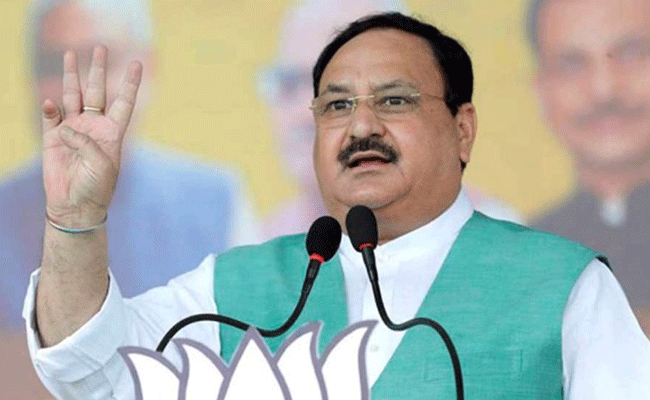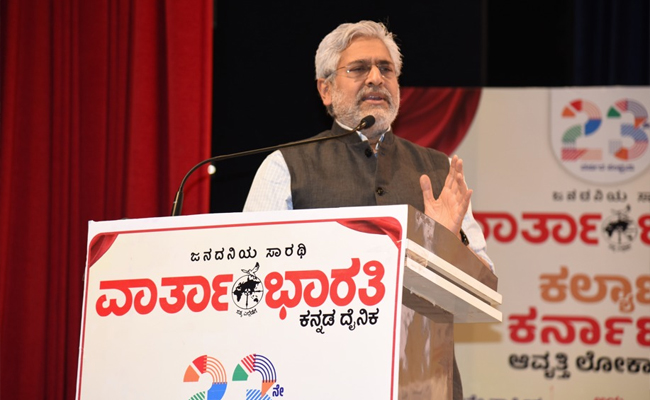Tumakuru (PTI): BJP national president J P Nadda on Thursday said Prime Minister Narendra Modi has created "politics of report card" in the country, and the party will face Karnataka polls, with a report card on its performance.
Congress' other name is "corruption, commission and casteism" and they should be made to sit at home, he said as he urged his party cadres to take the message of BJP's inclusive politics, and its belief in taking all sections of the society irrespective of religion, caste, gender together.
"When we go for election we will go with a report card, every single of our leaders, thumping their chests with pride, will say we had promised this and we have done it, we had not promised something, but still we have done it," Bommai said.
He called on party workers to tell people that neither former Chief Minister B S Yediyurappa nor incumbent Chief Minister Basavaraj Bommai has left any stone unturned to take Karnataka ahead.
Nadda was addressing BJP's "Shakti Kendra" heads meeting of Tumakuru and Madhugiri Assembly segments here, as the party prepares for Assembly polls likely by April-May.
He said he has come to the meeting to meet the workers, who work at the ground level and take the message of the party and the government to the people. "I have decided to visit all parts of Karnataka and directly speak to karyakartas as we prepare for upcoming elections."
Further asking party workers to organise "tiffin meetings" at Shakti Kedras and booth-level to unify the society and ending casteism, Nadda said exchange food, send out a message of togetherness and party's ideology.
State BJP president Nalin Kumar Kateel, party's national General Secretary in-charge of Karnataka Arun Singh, Ministers J C Madhuswamy, B C Nagesh, Araga Jnanendra among were present at the event.
Accusing the Congress party of votebank politics, dividing the people in the name of caste, creating regional divide, also indulging in casteism, dynasty and appeasement politics, the BJP president said from the time PM Modi took over, dynasty and caste politics has ended and with the mantra of 'Sabka Saath, Sabka Vikas', he is taking everyone ahead together.
From the time when Modi took over the responsibilities as the Prime Minister, he has changed the culture, conduct and the character of India's polity, he said, adding that "The political culture has totally changed."
Urging BJP karyakartas to strengthen the party's roots along with the agenda of development, Nadda said this has to be done to strengthen Karnataka, if the State has to be strengthened, the ideology of the BJP should be strengthened here.
Work towards creating an "able booth", he said, "our booth should not be weak, it should take all sections of the society together like religion, caste, age, gender. Unify everyone under BJP's symbol, and we have to work towards it. So give representation to all sections in your booth and shakti kendra, also ensure that Dalits are associated with the party, no caste should be left out."
Pointing out that several major economies like the US, China and Europe are in financial distress due to COVID and Ukraine war, the BJP president said, "Under Modi, India as a sound and stable economy, by maintaining stability it has overtaken Britain, which had once ruled us, to become fifth largest economy in the world."
Listing out various work and programmes of the BJP government in Karnataka, he also highlighted the decisions taken to meet the reservation demands by various communities.
Taking a dig at Congress leader and former Chief Minister Siddaramaiah for his Puppy' jibe at CM Bommai, Nadda said,
"I was pained because with such a statement, he has brought down the standard of Karnataka's politics. A leader is known by the statement he gives."
BJP respects its political opponents and under Modi it is strengthening cooperative federalism, he said, "They (Congress leaders) fight here, they don't get opportunity to meet their high command, today speak lightly about others."
Let the Truth be known. If you read VB and like VB, please be a VB Supporter and Help us deliver the Truth to one and all.
Srinagar (PTI): Property worth Rs 1 crore belonging to a notorious drug peddler was on Saturday attached in Jammu and Kashmir's Srinagar, police said.
A double-storey house on eight marlas of land situated at Wantpora Eidgah, belonging to Basit Bilal Dar, a notorious drug peddler, valued at approximately Rs 1 crore, a police spokesperson said.
He said Dar is involved in two cases registered under various sections of the NDPS Act.
During investigation, it was established that the accused had acquired the said property through illicit proceeds generated from drug trafficking activities, the spokesperson said.
Consequently, the property was attached under the provisions of the NDPS Act. The attachment proceedings were conducted in the presence of the two independent witnesses, strictly in accordance with the prescribed legal procedures, he said.
As per the attachment order, the owner has been restrained from selling, leasing, transferring, altering, or creating any third-party interest in the property till further orders, the spokesperson added.





